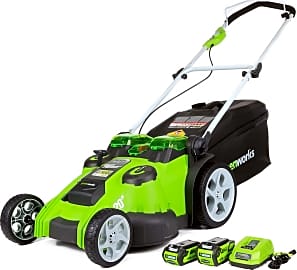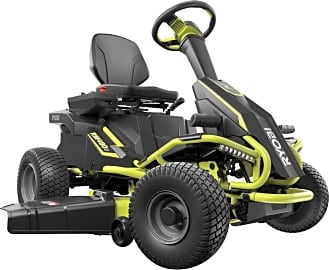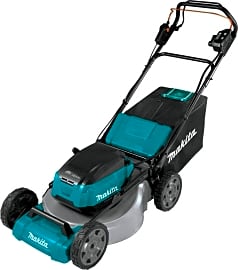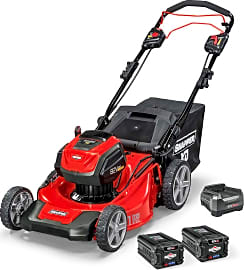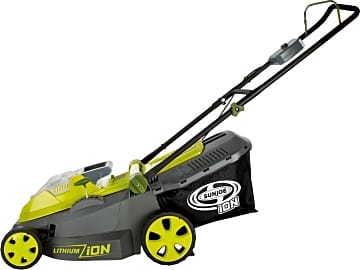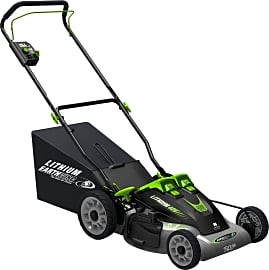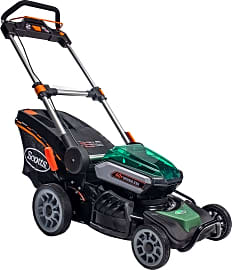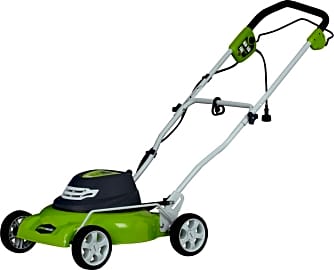The 10 Best Electric Lawn Mowers

This wiki has been updated 41 times since it was first published in May of 2015. If you don't like the mess, smell, noise, and maintenance of gas-powered lawn mowers, it might be time to invest in an electric model. They're ideal for quickly and efficiently cutting the grass, while being far more eco-friendly than their fossil fuel-guzzling counterparts, which means you’ll be helping the environment. Our selection includes corded and convenient battery-powered options. When users buy our independently chosen editorial picks, we may earn commissions to help fund the Wiki.
Editor's Notes
August 10, 2020:
As technology increases, electric lawn mowers are getting closer and closer to matching their gas-powered brethren. With that obstacle out of the way, there are few reasons not to consider an electric model, whether you opt for a corded or cordless one. They are both quieter and more environmentally friendly than gas models, and they also require less maintenance.
With this latest update, we wanted to provide our readers with a bit more variety, both in the brands represented and in their respective capabilities. With that in mind, we decided to eliminate the Ryobi RY40180, which didn't offer anything more than some of the other models with roughly 20-inch decks, such as the Ego Power+ LM2000-S or Snapper XD Max, however the former is equipped with useful LED headlights and the latter is self-propelled, and the Ryobi doesn't offer either of those benefits. In its place we added the Ryobi RM480e, which is one of the few electric riding mowers available.
We also included the Makita XML08PT1 during our most recent update. Not only is Makita known for making extremely reliable power tools, but this particular model has a four-bay battery bank that allows it to offer one of the longest run times. In fact, it can get through a half-acre yard on a single charge.
For those with small yards with a lot of tight spaces, the Sun Joe Ion16LM is most likely their best option. It has just a 16-inch deck, so it can squeeze through areas others can't, and it weighs a touch under 40 pounds, so you shouldn't have any trouble maneuvering it. While on the topic of maneuverability, we would be remiss if we didn't mention the Worx WG719 which has casters on the front rather than fixed wheels. This allows for a tighter turning radius than many others.
April 12, 2019:
When evaluating the best electric lawn mowers, we chose to include a mix of corded and battery-powered options. While the battery operated choices offer a lot of convenience and their run times have greatly increased over the years, some users still prefer to work around the cord and not have to worry about the battery running out just short of finishing the whole yard. They also tend to be a little more budget-friendly, like the Greenworks 25022.
The Ego Power+ Cordless takes the top spot among these high-quality offerings for including a rapid charger and an impressive 7.5Ah battery that can last about 90 minutes, which is more than enough time to cover most lots in one session.
Special Honors
Toro 20363 The Toro 20363 is equipped with a load-sensing technology that delivers extra cutting power when needed, and conserves battery life when it isn't. It also automatically senses and adapts to your walking speed, allowing you to mow your lawn at whatever pace is most comfortable for you. toro.com
Stihl RMA 510 V The Stihl RMA 510 V has a key that prevents accidental starting of the motor, but when inserted you can instantly fire it up at the push of a button. It is equipped with fade-free technology, so it continues to work at full power until the battery is completely depleted, and it can be stowed in three positions to meet practically any storage requirement. stihlusa.com
Something's Always Got To Burn
Am I telling you not to get a powered mower at all, to go out and get a push mower that might drive you mad with the sheer effort of it?
One of the things that draws consumers to electric mowers is that they seem to be a cleaner means of cutting your lawn than their gas-powered brothers.
This is true at the ground level. You won't have to deal with the noxious exhaust spewing out of your mower in a cloud of stinky sadness if you go with electric.
Also, the cost to charge a battery powered mower is usually cheaper, making it that much more economically feasible than gas. There are no spark plugs to change, no oil to gauge or filters to replace. Really, there's a lot to like about these electric units.
But we should be clear about one thing: the majority of electricity in this country comes from burning coal, which has its own set of environmental terrors to it, from mountaintop removal to the horrendous pollution of water sources around mines, as well as the carbon emissions from coal fired power plants.
Am I telling you not to get a powered mower at all, to go out and get a push mower that might drive you mad with the sheer effort of it? Absolutely not.
In fact, the point I'm making is that, even if stationary coal emissions come with their own problems, your electric mower will get progressively greener as the grid does. That makes it the best possible investment in your lawn care future.
The Question Of The Cord
With electric mowers, the biggest question is whether to go with a corded model or to get yourself a battery operated unit.
When I was 11, I went around the neighborhood with a corded electric mower offering lawn service. It was a lucrative summer. I did three to four lawns each day for three or four days a week, depending on the weather. I worked in the morning, and had the rest of the days ahead of me.
Which is all to say that I have some experience with the cord wrangling that a corded electric mower necessitates.
If you have a very large yard, and you like to take your time with your mowing, to really enjoy being outside in your space, you might be better served by a corded model.
I was a kid, so I made a game of it, treating the cord like a lasso and playing at being a cowboy. I was a big Gene Autry fan in those days. It was necessary for my sanity, even at 11, so I could only imagine what it's like to work a corded mower with the less childlike mind of an adult.
You're almost always going to get more power out of a corded electric, as the battery powered mowers need to conserve as much energy as possible to get the most out of their charge.
I could never have done my summer schedule with a battery powered model simply because after one or two lawns it would need to be recharged. Then I never could have afforded my first guitar, which, for the record, was a great little knock-off stratocaster made by Fernandes.
If you have a very large yard, and you like to take your time with your mowing, to really enjoy being outside in your space, you might be better served by a corded model. This is also true if you have especially gnarly grass, as corded models can cut with more force.
If you've got a smaller space with lighter grass, a battery powered unit will save you time in cord management, and valuable hours otherwise spent in psychotherapy.
Lawnmowers With Horsepower
If you want to get technical, the first lawnmowers weren't really lawn mowers in the way we think of them today. They were animals, grass grazing animals to be specific.
Keeping animals on your lot for milk, meat, or wool would also provide you with a free (and often delicious) source of grass management.
If you want to get technical, the first lawnmowers weren't really lawn mowers in the way we think of them today.
Still, some land owners, gardeners, and groundskeepers found that the scythe was awfully labor intensive. In the 1830s, the first lawnmower cropped up in England, and it was more or less identical to the kinds of push mowers that are still produced today.
As with most such innovations, though, advancement was inevitable, and before long mowers were bigger, and were often pulled along by the very animals that land owners once relied on to eat the grass.
Around the turn of the 20th century, gas powered motors increased the power and efficiency of the common lawnmower, and those specs, along with nuances in collecting and distributing cut grass, the fine adjustment of cutting height, and the weight and durability of materials have all been tweaked to near perfection over the last century.
Now, we move with confidence in the electric direction, with mowers at least as powerful as the gas powered units sold alongside them. And the landscape will only get greener as solar and wind power make their way deeper and deeper into the grid.


